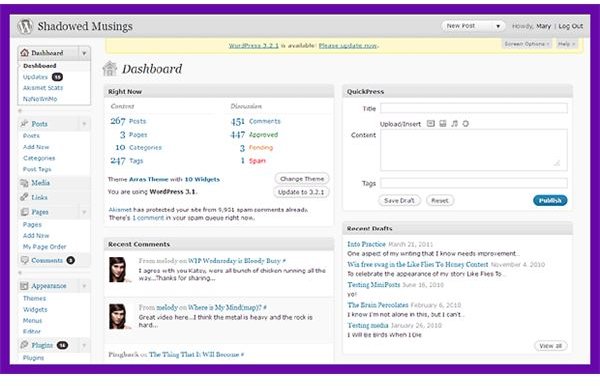To Blog or Not to Blog: Pros and Cons of Blogs Sharing a Company Domain Name
There was a time when having a blog for your website was a novelty. But with the ease of using Blogger, Wordpress, and even social media websites such as Facebook to post your blog, you have to make a concerted effort to make your business blog stand out.
This article will discuss the different options you have for hosting your business blog, and the pros and cons of blogs sharing a company domain name.
Hosting Your Business Blog
Starting a business blog is about more than posting the occasional product photos or information on your latest sale. A business blog can be a powerful tool that allows you to have discussions with your customers instead of simply talking to them. Creating relationships with customers can be a key to making your business a success, and hosting your business blog is one of the quickest ways to obtain word-of-mouth marketing and build a loyal customer base.
But should you host the blog on your company domain? Consider these advantages and disadvantages before you decide to start your business blog:
Advantages
- Keep control of content: gives you complete control of your brand and how it is presented to potential customers.
- Flow of traffic: creates an automatic traffic flow between your website in your blog and with strategically-worded blog posts, you can drive readers directly to the products they are looking for.
- Engaging with customers: creates an automatic platform for you to engage with your customers, to exchange in discussions and brainstorm ideas with your customers, which will make them more loyal.
- Building your brand: creates an automatic link between your blog and your brand, allowing readers to associate the two, and leave a lasting impression of your marketing message in their mind.
Disadvantages
- Under clutter: an extensive catalog of blog posts can take the focus away from what it is you are selling. While you want to keep your blog updated, you also want to make sure the most important thing that people discover at your website is your product.
- Popularity: if your blog becomes extremely popular, it can slow down the load-time of your website. You do not want to risk losing customers because your blog takes too long to load from a large influx of traffic.
A business blog can be a powerful tool in your online marketing methods. Be sure to weigh the pros and cons to determine whether you have the time, resources and dedication to hosting your own business blog.
Using a Third-Party Website to Host Your Blog
Third-party websites offer an easy alternative to hosting your business blog. Since they provide the blogging platform for you, it makes the prospect of sharing your thoughts not seem as daunting.
However, putting your trust in another website to host your blog has its own set of advantages and disadvantages that you need to take into consideration:
Advantages:
- Ease-of-use: with a little customization, you can be up and running with your own business blog very quickly.
- Impartiality: not touching your business blog to your company.
- Comments: blog may make people more likely to comment on post.
Disadvantages:
- A needle in a haystack: without having the direct link from your website to your blog, readers may find it difficult. It may make it difficult for readers to find your blog.
- Cost of use: many websites offer free options for business bloggers, often times they do not include advanced features or customization options. So, your choices may be limited.
- Creating back links: hosting your blog on your own website automatically increases your search engine visibility. Creating keyword rich content, will send targeted users to the third-party website, rather than your own domain.
An excellent choice for small business owners who have never blogged before, third-party websites make it easy to dip your toes into the blogging world. However, be sure you know the limitations of your chosen provider before you decide to put your trust in another blog host.
Blogging Resources for Entrepreneurs
There are a number of blogging applications and websites you can use to get your business blog up and running.
Wordpress: With both a hosted (Wordpress.com) and self-hosted (Wordpress.org) option, Wordpress is incredibly popular for users looking for advanced blogging powers. Customizable templates, interactive widgets and an extensive collection of plug-ins, Wordpress offers a completely customizable blogging platform that will allow you to put your own stamp on your business blog so that it blends seamlessly with the look of your website.
Blogger: A third-party website that offers to host your blog for you, Blogger is a flexible option that allows for some customization without the need to learn new coding or programming languages.

Facebook: While there are a number of third-party applications that can import your blog into Facebook, the Notes feature can be used to post messages to your Facebook profile or Facebook page. If you already have a number of followers to your Page, this is an ideal way to keep them updated and turn the social media website into your own mini-blog.
Things to Consider
Before you decide to take the first step into the blogging world, you must weigh the pros and cons of blogs sharing a company domain name.
Depending on the message you want to blog about, what image you want to portray to customers, and how blogging will fit into your social marketing strategy, starting a business blog is a big decision. Whichever option you choose, remember the key to successful blogging is to create an ongoing channel of communication between you and your customers.
References
- Ward, Chris. “Where Do I Host My Business Blog?”, http://www.techwyse.com/blog/search-engine-optimization/where-do-i-host-my-business-blog/
- Thomas, Lorrie. “Free Blogs vs. Hosting Your Own Blog: Pros and Cons”, http://www.wilsonweb.com/design/thomas-blog-options.htm
- Images: screenshots are by the author
